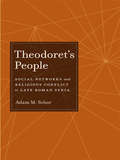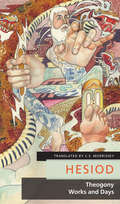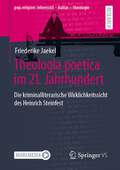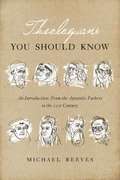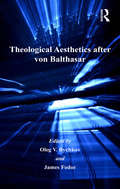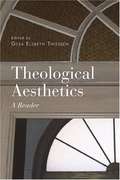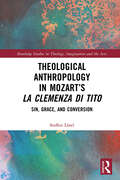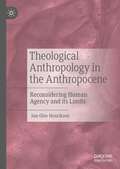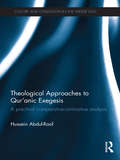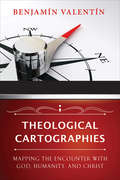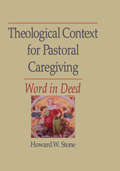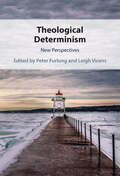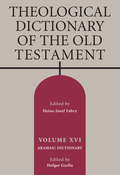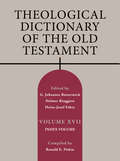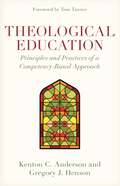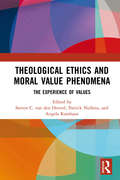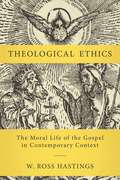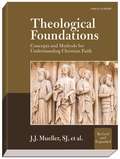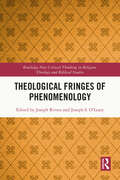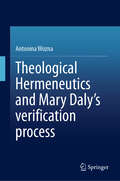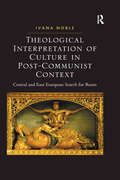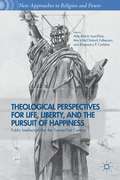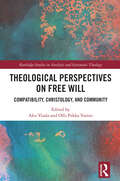- Table View
- List View
Theodoret's People: Social Networks and Religious Conflict in Late Roman Syria
by Adam M. SchorTheodoret's People sheds new light on religious clashes of the mid-fifth century regarding the nature (or natures) of Christ. Adam M. Schor focuses on Theodoret, bishop of Cyrrhus, his Syrian allies, and his opponents, led by Alexandrian bishops Cyril and Dioscorus. Although both sets of clerics adhered to the Nicene creed, their contrasting theological statements led to hostilities, violence, and the permanent fracturing of the Christian community. Schor closely examines council transcripts, correspondence, and other records of communication. Using social network theory, he argues that Theodoret's doctrinal coalition was actually a meaningful community, bound by symbolic words and traditions, riven with internal rivalries, and embedded in a wider world of elite friendship and patronage.
Theogony / Works and Days
by Hesiod Roger Scruton Eric Voegelin C. S. MorrisseyPhilosopher C.S. Morrissey adapts Hesiod's two great works, Theogony and Works and Days, taking into account the poet's essential meditative insights that paved the way for the subsequent achievements of Greek philosophy,most notably of Plato, and thereby gave a distinctive shape to all of Western philosophy. Theogony recounts the genesis of the first generations of the Greek gods and recollects how Zeus used both force and persuasion to establish his cosmic reign of justice. Works and Days tells the story of the origin and ordination of human beings within this cosmos and their perennial struggle to win order from disorder in a world overwhelmed by harsh sorrows and injustice.In the wake of personal adversity and suffering, Hesiod was inspired by the Muses to sing out against the untruth of society and to disclose the truth about justice in the cosmos. Theogony, which won him his laurels in a poetic competition, begins by telling of how the Muses chose him as an individual vessel of inspiration, to be a rival to Homer and the old myths with a newer vision of the struggle for justice among the gods. In Works and Days, Hesiod includes these autobiographical details within a reflection on the two-fold role of competition in life: "the bad strife" is visible everywhere in the manifold forms of universal disorder, although "the good strife" is part of the struggle to maintain order in the wake of chaos and the primeval void.These new translations are contextualized with a foreword by distinguished philosopher Roger Scruton and text by the late philosopher and historian Eric Voegelin, who argues the magnitude of Hesiod's influence on Greek philosophy and Western history, and how his sublime contribution to literature has formed a signal bridge between myth and metaphysics.
Theologia poetica im 21. Jahrhundert: Die kriminalliterarische Wirklichkeitssicht des Heinrich Steinfest (pop.religion: lebensstil – kultur – theologie)
by Friederike JaekelDas vorliegende Buch zielt auf eine theologische Sensibilisierung für explizit nicht religiös qualifizierte Literaturformen. Durch eine interdisziplinäre und kulturhermeneutische Konzeption wird ein Beitrag für die Praktische Theologie, den aktuellen literaturtheologischen Forschungsdiskurs sowie für die Gestaltung von Kirche und Predigt sichergestellt. Im Rahmen einer exemplarischen Auseinandersetzung mit dem kriminalliterarischen Werk des Schriftstellers Heinrich Steinfest wird der Frage nachgegangen, ob sich innerhalb eines literarischen Werks eine sogenannte unsichtbare Theologie ausmachen lässt, die sich als die Artikulation und Reflexion einer unsichtbaren Religion verstehen lässt und somit ein neues Licht auf die Frage nach der Umformung des christlichen Denkens in der Neuzeit wirft.
Theologians You Should Know: An Introduction: From the Apostolic Fathers to the 21st Century
by Michael Reeves<p>Whether you realize it or not, you are the beneficiary of centuries of careful study and reflection on God's Word. The writings and teachings of figures from the past are crucial to what the church believes today. But just like intriguing guests of honor at a dinner party, these theologians can be intimidating to get to know. <p>Introducing you to the lives and thought of figures such as the Apostolic Fathers, Justin Martyr, Augustine, Thomas Aquinas, Martin Luther, John Calvin, Karl Barth, and others, this book makes the writings of these significant theologians accessible and approachable―opening up for you the riches of church history and enlarging your vision of God and his plan for the world.</p>
Theological Aesthetics after von Balthasar (Routledge Studies in Theology, Imagination and the Arts)
by James FodorThis collection of essays by distinguished authors explores the present-day field of theological aesthetics: from von Balthasar’s contribution and parallel developments to correctives and alternatives to his approach. A tribute to von Balthasar’s own project expands into a dialogue with ancient and medieval traditions in search of revelatory aesthetics. The contributors outline challenges to his approach (including Protestant perspectives) and introduce new ways of viewing the field of theological aesthetics, which ultimately opens up to the idea of concrete cultural contexts and practical human needs determining the use of the arts and aesthetic sensibilities in theology.
Theological Aesthetics: A Reader
by Gesa Elsbeth ThiessenThese engaging readings range broadly over themes at the intersection of religion and the arts, including beauty and revelation, the vision of God, artistic and divine creation, God as artist, images of God, the interplay of the senses and the intellect, human imagination, mystical writings, meanings of signs and symbols, worship, liturgy, doxology, the relationship of word and image, icons and iconoclasm, the role of the arts in twentieth-century theology, and much more.
Theological Anthropology in Mozart’s La clemenza di Tito: Sin, Grace, and Conversion (Routledge Studies in Theology, Imagination and the Arts)
by Steffen LöselThis book asks what theological messages theologically educated Catholics in late-eighteenth-century Prague might have perceived in Mozart’s late opera seria La clemenza di Tito. The book’s thesis is two-fold: first, that Catholics might have heard the opera’s advocacy of enlightened absolutism as a celebration of a distinctly Catholic understanding of political governance; and second, that they might have found in the opera a metaphor for the relationship between a gracious God and humanity caught up in sin, expressed as sexual concupiscence, pride, and lust for power. The book develops its interpretation of the opera through narrative character analyses of the main protagonists, an examination of their dramatic development, and by paying attention to the biblical and theological associations they may have evoked in a Catholic audience. The book is geared towards academic readers interested in opera, theologians, historians, and those who work at the intersection of theology and the arts. It contributes to a better understanding of the theological implications of Mozart’s operatic work.
Theological Anthropology in the Anthropocene: Reconsidering Human Agency and its Limits
by Jan-Olav HenriksenThe Anthropocene presents theology, and especially theological anthropology, with unprecedented challenges. There are no immediately available resources in the theological tradition that reflect directly on such experiences. Accordingly, the situation calls for contextually based theological reflection of what it means to be human under such circumstances. This book discusses the main elements in theological anthropology in light of the fundamental points: a) that theological anthropology needs to be articulated with reference to, and informed by, the concrete historical circumstances in which humanity presently finds itself, and b) that the notion of the Anthropocene can be used as a heuristic tool to describe important traits and conditions that call for a response by humanity, and which entail the need for a renewal of what a Christian self-understanding means. Jan-Olav Henriksen explores what such a response entails from the point of view of contemporary theological anthropology and discusses selected topics that can contribute to a contextually based position.
Theological Approaches to Qur'anic Exegesis: A Practical Comparative-Contrastive Analysis (Culture and Civilization in the Middle East)
by Hussein Abdul-RaofThis book provides a comprehensive and systematic analysis of the various schools of Qur'anic exegesis, from the earliest periods through to the present day. Employing a comparative-contrastive methodology, the author examines traditional and rational schools of thought – such as the Mu’tazili, Shi’i, Ibadi, Sufi, metaphysical, modern, and scientific approaches to the interpretation of the Qur’an – to give a detailed analysis of the similarities and differences in their theological views. The study spans a broad period, covering exegetical techniques adopted in Qur’anic exegesis from its infancy during the 1st/7th century up to the beginning of the 15th/21st century. Furnished with copious micro- and macro-level examples which explicate the Qur’anic notions and the points of view relevant to each school and exegetical approach, the book provides a rounded empirical study of Islamic thought. This thorough and holistic historical investigation is an important contribution to the study of Qur’anic exegesis and Islamic theology, and as such will be of enormous interest to scholars of religion, philosophy and Islamic studies.
Theological Cartographies: Mapping the Encounter with God, Humanity, and Christ
by Benjamín ValentínBenjamín Valentín presents a substantive yet accessible introduction to the three central doctrines of Christian theology: God, humanity, and Christ. In an engaging style, Valentín offers an overview of each of these doctrines, delving into its tradition within the Christian community throughout history, from the writing of Scripture forward. He further explores what contemporary life tells us about this doctrine and how that compares to traditional understandings and then determines how we can reconstruct this doctrine in light of our new assessment of it. Each chapter concludes with suggested readings for further study. Throughout, Valentín highlights the diversity of Christian thought, bringing together past tradition and contemporary questions to arrive at a new understanding of what these important doctrines can mean for us today.
Theological Context for Pastoral Caregiving: Word in Deed
by William M Clements Howard W StoneIn Theological Context for Pastoral Caregiving, Howard W. Stone helps his fellow pastors and worship leaders provide effective and faithful pastoral care and counseling through the study of the correlation between pastoral care and theology. You will learn that in order for pastoral care to be effective it must have a theological base to shape the caregiving experience. At the same time, theology must be informed by the needs and experiences of the people being served and by the ministry of pastoral care. By relating these two issues, you gain a unique viewpoint not offered by books with simply a psychological focus.The author draws from his day-to-day clinical practice of pastoral care and counseling to show how pastoral care and theology can be brought together. Through Howard Stone’s work, the reader learns of: an overview of pastoral care and counseling today how to provide a pastoral assessment of the persons served the author’s theological understanding of the ministry of pastoral care and counseling methods for correlating theology and pastoral care how spiritual direction as a discipline can help pastoral care and counseling ministry regain a solid theological base theological themes that might be more explicitly and intentionally related to pastoral careTheological Context for Pastoral Caregiving provides useful information for parish pastors, people in training to be parish pastors, and specialists in the field of pastoral care counseling. As one of the easiest-to-read books on this subject, it can also be used as a text for graduate-level classes in courses such as Theology and Pastoral Care, Pastoral Theology, and Practical Theology. With this book, seminary students will finally be able to relate the practical things learned in pastoral counseling classes with what is learned in theology classes.
Theological Determinism: New Perspectives
by Peter Furlong Leigh VicensThis volume unites established authors and rising young voices in philosophical theology and philosophy of religion to offer the single most wide-ranging examination of theological determinism-in terms of both authors represented and issues investigated-published to date. Fifteen contributors present discussions about theological (or divine) determinism, the view that God determines everything that occurs in the world. Some authors provide arguments in favor of this position, while others provide considerations against it. Many contributors investigate the relationship between theological determinism and other philosophical issues (the principle of sufficient reason; the compatibility of determinism and free will; moral luck), theological doctrines (creation ex nihilo; divine forgiveness; the inevitability of sin; the unity of Christ's will with God's), or moral attitudes and practices (trusting God; resenting the ill-will of others; resisting evil). This book is essential reading for all those interested in the relationship between theological determinism and philosophical thought.
Theological Dictionary of the Old Testament, Volume XVI (Theological Dictionary Of The Old Testament Ser. #11)
by G. Johannes Botterweck; Helmer Ringgren; Heinz-Josef FabryVolume XVI concludes the monumental, critically acclaimed Theological Dictionary of the Old Testament with an Aramaic dictionary.This latest and last TDOT volume incorporates nearly the complete lexicon of Biblical Aramaic as well as a major portion of the theologically, culturally, and historically relevant terms in other ancient Aramaic writings. Each article provides information on the term&’s meaning and usage, is fully annotated, and contains a bibliography with cross-references to the entire TDOT series.Further enhancing this volume are an introductory overview of the history of Aramaic and a comparative grammatical outline of ancient Aramaic at the end of the book.
Theological Dictionary of the Old Testament, Volume XVI (Theological Dictionary Of The Old Testament Ser. #14)
by G. Johannes Botterweck; Helmer Ringgren; Heinz-Josef FabryVolume XVI concludes the monumental, critically acclaimed Theological Dictionary of the Old Testament with an Aramaic dictionary.This latest and last TDOT volume incorporates nearly the complete lexicon of Biblical Aramaic as well as a major portion of the theologically, culturally, and historically relevant terms in other ancient Aramaic writings. Each article provides information on the term&’s meaning and usage, is fully annotated, and contains a bibliography with cross-references to the entire TDOT series.Further enhancing this volume are an introductory overview of the history of Aramaic and a comparative grammatical outline of ancient Aramaic at the end of the book.
Theological Dictionary of the Old Testament, Volume XVII: Index Volume (Theological Dictionary of the Old Testament)
by Ronald E. PitkinThis useful resource, which concludes the illustrious Theological Dictionary of the Old Testament, provides TDOT users with an index to all sixteen previous volumes. The first part of this volume indexes keywords in Hebrew, Aramaic, and English, while the second part indexes all textual references—both biblical and extrabiblical.
Theological Education: Principles and Practices of a Competency-Based Approach
by Kenton C. Anderson Gregory J. HensonTheological Education demonstrates how churches and seminaries can cooperate through a competency-based learning approach to ministry preparation--that is, competency-based theological education (CBTE). CBTE focuses on the mutual mission of the church and theological education: developing followers of Christ who flourish in their vocations. This first book-length treatment of CBTE lays the groundwork for expansion and refinement as theological schools and churches move together in partnership, exploring: - Principles that ground successful CBTE cooperation, such as collaborative mission, contextualized discipleship, and holistic assessment; and - Practices that a CBTE approach requires, such as affordable programs, flexible technology, and continuous improvement Using the CBTE model means seminaries can provide practical ministry training together with churches who invest in the theological education of those who minister among them.
Theological Ethics and Moral Value Phenomena: The Experience of Values
by Patrick Nullens Angela Roothaan Steven C. Van Den HeuvelThe experience of moral values is often side-lined in discussions about moral reasoning, and yet our values define a large part of our moral motives, standards and expectations. Theological Ethics and Moral Value Phenomena explores whether the experience of a meeting point of the immanent and the transcendent, i.e. the moral self and God, can be the source of our values. The book starts by arguing for a greater theological engagement with value ethics, personalism and the phenomenological method by drawing on thinkers such as Max Scheler and William James. It then provides an understanding of the social and religious dimension of the valuing person, demonstrating the importance of the emotional, as well as the cognitive, dimension of value experience. Finally, this value perspective is utilised to engage with current moral issues such as professional ethics, environmental ethics, economical ethics and family ethics. Integrating the concepts of religious experience, moral motivation, and subjective and objective value within a broad framework of Christian theology and philosophy, this is vital reading for any scholar of Theology and Philosophy with an interest in ethics and moral reasoning.
Theological Ethics: The Moral Life of the Gospel in Contemporary Context
by W. Ross HastingsBe Prepared to Think Theologically through Today's Most Pressing Ethical and Moral Issues In Theological Ethics theologian, pastor, and ethicist W. Ross Hastings gives pastors, ministry leaders, and students a guide designed to equip them to think deeply and theologically about the moral formation of persons in our communities, about ethical inquiry and action, and about the tone and content of our engagement in the public square. The book presents a biblical perspective and a gospel-centered framework for thinking about complex contemporary issues in ways are life-giving and that will lead readers into greater flourishing as human persons in community.This book is distinctive in presenting:A framework for theological ethics that is robustly theological and Trinitarian. Ethics isolated from the gospel and theology becomes bad news, but when it is informed by and empowered by participation in the triune God of grace, it is part of the good news of the gospel.An approach to theology and theological ethics that makes the Word of God the ultimate authority and it is therefore grounded in the biblical narrative and texts.An understanding that theological ethics are inherently missional. The church as the image of the triune God makes it the home of ethics, but in light of its missional identity, it will reverberate outwards to engage the world in ways that are humble and not power-mongering, that are gospel-based and shalom-evoking. Theological Ethics is for those who lead churches or ministries (or someday will) and who urgently need deep theological grounding as they daily encounter ethical and moral issues where they need to provide a gracious, truthful, and gospel-directed response.X
Theological Foundations: Concepts and Methods for Understanding Christian Faith (Revised and Expanded Edition)
by J. J. MuellerThis book is about how to successfully study theology and provides a solid foundation for a theological discussion.
Theological Fringes of Phenomenology (Routledge New Critical Thinking in Religion, Theology and Biblical Studies)
by Joseph Rivera Joseph S. O’LearyThis book focuses on the relationships between phenomenology and theology, which have been varied and complex but seem currently in an inconclusive and loosely defined state. Methodological rigor is not much in evidence, and the two disciplines continue to defy any authoritative synthesis. While both disciplines grapple with questions concerning the fundamental structures of human experience, their relationship is troubled by the elusive roles of Revelation and faith, which threaten the scientific autonomy of philosophy on one side and disable theologians for consistent philosophical discourse on the other. This volume revisits that conundrum from various perspectives, as it at once repristinates some of the most vibrant points of encounter and opens possibilities for new beginnings. It begins with the theological musings into which leading phenomenologists have been drawn from the start, with special reference to Husserl, Heidegger, and Michel Henry, as well as backward glances to Fichte, Schelling, and Blondel. A second section takes up specific theological themes and examines how phenomenological approaches can refine thinking on them. These include the Incarnation, the Resurrection, the Eucharist, Grace, and Prayer. A dialogue between phenomenology and classical theologians is staged in the third section: Augustine, Pseudo-Dionysius, Eckhart, and Karl Rahner. The closing section ranges more widely, discussing atheism, non-realist theology, and Hinduism from phenomenological angles, and showing how these topics too come within the ambit of theology.
Theological Hermeneutics and Mary Daly's verification process
by Antonina WoznaTheological Hermeneutics and Daly's verification process offers an original overview of Mary Daly’s inputs to the theological hermeneutics from the feminist perspective. In the context of multiple theological methodologies and a growing interest for gender and feminist studies, it provides keys to design relevant approach to theology as a method. This book shows how gender bias affects theological discourses and how gender discourse oriented to the good of women, can be a paradigm of theology and a criterion of the most effective transmission of faith and social transformation. This book is an important read for scholars working in the intersection of theology, gender and feminism, and a great addition to Antonina Wozna's book on Mary Daly’s (1928-2010) Theological Method of Ontolinguistic Hermeneutics.
Theological Interpretation of Culture in Post-Communist Context: Central and East European Search for Roots
by Ivana NobleTwenty years after the fall of Communism in Central and East Europe is an ocassion to reevaluate the cultural and theological contribution from that region to the secularization - post-secularization debate. Czech theologian Ivana Noble develops a Trinitarian theology through a close dialogue with literature, music and film, which formed not only alternatives to totalitarian ideologies, but also followed the loss and reappeareance of belief in God. Noble explains that, by listening to the artists, the churches and theologians can deal with questions about the nature of the world, memory and ultimate fulfilment in a more nuanced way. Then, as partakers in the search undertaken by their secular and post-secular contemporaries, theologians can penetrate a new depth of meaning, sending out shoots from the stump of Christian symbolism. Drawing on the rich cultures of Central and East Europe and both Western and Eastern theological traditions, this book presents a theological reading of contemporary culture which is important not just for post-Communist countries but for all who are engaged in the debate on the boundaries between theology, politics and arts.
Theological Introduction to the Old Testament
by Walter Brueggemann Bruce C. Birch Terence E. Fretheim David L. PetersenTheological Perspectives For Life, Liberty, And The Pursuit Of Happiness
by Ada María Isasi-díaz Mary Mcclintock Fulkerson Rosemary P. CarbineRather than wield religion as a weapon or a ruse in irrational appeals, the book attempts to reimagine a shared American mythos and ethos, by reminding us of our shared stake in creating an America committed to the life of all peoples and species and to the full developments of our capabilities as an exercise of liberty.
Theological Perspectives on Free Will: Compatibility, Christology, and Community (Routledge Studies in Analytic and Systematic Theology)
by Aku Visala Olli-Pekka VainioFree will is a perennial theological and philosophical topic. As a central dogmatic locus, it is implicated in discussions around core Christian doctrines such as grace, salvation, sin, providence, evil and predestination. This book offers a state-of-the-art look at recent debates about free will in analytic and philosophical theology. The chapters revolve around three central themes: the debate between theological compatibilists and libertarians, the communal nature of Christian freedom, and the role of free will in Christology. With contributions by leading scholars, the volume provides a valuable overview of current arguments as well as novel openings and ideas for further discussion.
